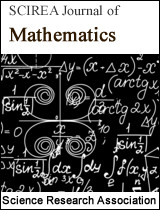Knowledge Reasoning Based on the Generalized Syllogism FMO-3
DOI: 10.54647/mathematics110485 40 Downloads 11834 Views
Author(s)
Abstract
This paper focuses on the validity and reducibility of the non-trivial generalized syllogisms with the quantifiers in Square{some} and Square{fewer than half of the}. To this end, this paper firstly presents knowledge representations of generalized syllogisms, and then proves the validity of the syllogism FMO-3, and subsequently deduces the other 21 valid non-trivial generalized syllogisms from the validity of the syllogism FMO-3. That is to say that there are reducible relations between/among these 22 valid non-trivial generalized syllogisms. This is so because the deduced syllogisms in this paper only involve the following 8 quantifiers: no, all, not all, some, fewer than half of the, most, at most half of the, and at least half of the, and because any of the first four quantifiers can define the other three quantifiers, as well as because the same goes for the last four quantifiers. This formal deductive reasoning not only provides a theoretical basis for English language information processing, but also inspiration for studying other kinds of syllogisms.
Keywords
generalized quantifiers; generalized syllogisms; validity; reducibility; knowledge reasoning
Cite this paper
Yijiang Hao,
Knowledge Reasoning Based on the Generalized Syllogism FMO-3
, SCIREA Journal of Mathematics.
Volume 9, Issue 4, August 2024 | PP. 93-101.
10.54647/mathematics110485
References
| [ 1 ] | Endrullis, J. and Moss, L. S. (2015). Syllogistic logic with ‘most’. In: V. de Paiva et al. (eds.), Logic, Language, Information, and Computation, 124-139. |
| [ 2 ] | Hamilton, A. G. (1978). Logic for Mathematicians. Cambridge: Cambridge University Press. |
| [ 3 ] | Hao, L. H. (2024). Generalized syllogism reasoning with the quantifiers in modern Square{no} and Square{most}, Applied Science and Innovative Research, 8(1): 31-38. |
| [ 4 ] | Moss, L. S. (2008). Completeness theorems for syllogistic fragments, in F. Hamm and S. Kepser (eds.), Logics for Linguistic Structures, Berlin: Mouton de Gruyter, 143-173. |
| [ 5 ] | Peters, S. and Westerståhl, D. (2006). Quantifiers in Language and Logic. Oxford: Claredon Press. |
| [ 6 ] | Westerståhl, D. (2007). Quantifiers in formal and natural languages. In: D. M. Gabbay and F. Guenthner (eds.), Handbook of Philosophical Logic, 14: 227-242. |
| [ 7 ] | Zhang, X. J., and Wu, B. X. (2021). Study on Chinese Discourse Inference. Beijing: People’s Publishing House. (in Chinese) |
| [ 8 ] | Wei, L, and Zhang, X. J. (2023). The reducibility of modal syllogisms based on the syllogism EI◇O-2, SCIREA Journal of Mathematics, 8(3): 87-96. |
| [ 9 ] | Yu, S. Y., and Zhang, X. J. (2024). Knowledge reasoning about the Aristotelian syllogism IAI-4, SCIREA Journal of Mathematics, 9(2): 23-30. |
| [ 10 ] | Zhang, C. (2022). The remaining 23 valid Aristotelian syllogisms can be deduced only from the syllogism IAI-3. SCIREA Journal of Computer, 7(5): 85-95. |
| [ 11 ] | Zhang, X. J. (2018). Axiomatization of Aristotelian syllogistic logic based on generalized quantifier theory. Applied and Computational Mathematics, 7(3): 167-172. |

